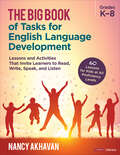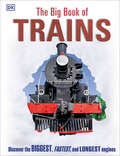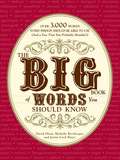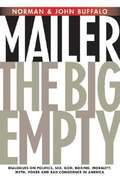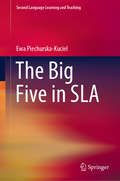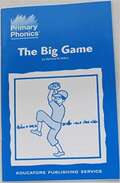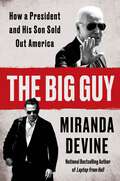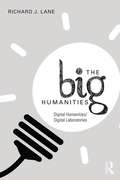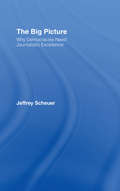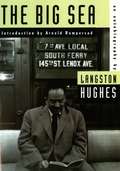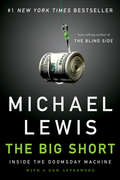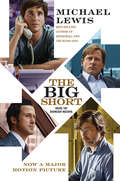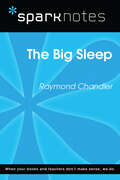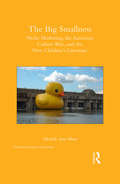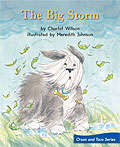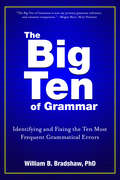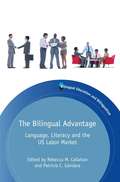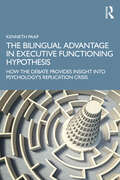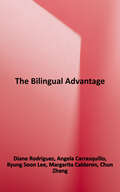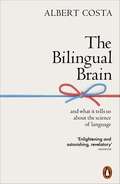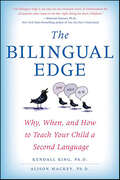- Table View
- List View
The Big Book of Tasks for English Language Development, Grades K-8: Lessons and Activities That Invite Learners to Read, Write, Speak, and Listen (Corwin Literacy)
by Nancy AkhavanReady-to-go English Language Development tasks that focus on students "doing the doing" of talking, reading, listening, and responding. In recent years, the percentage of English Language Learners (ELLs) has increased in almost every state, so most teachers are faced with the challenge of teaching literacy to students acquiring English alongside English-speaking students. However, in many integrated learning situations, English Language Development (ELD) instruction is strikingly different than the teaching we provide students whose first language is English. The Big Book of Tasks for English Language Development helps teachers meet that challenge head-on! Bestselling author and esteemed education consultant Nancy Akhavan shows that teaching multilingual learners requires changing our instruction to focus on practices that have high impact for students as they acquire language. Yet it’s not about doing more— it’s about doing smarter. It’s about having high expectations for all students and providing scaffolds to support students at all levels of English language proficiency as they learn and grow more confident. All the ready-to-go activities in the book Center on active tasks where students do the thinking, talking, reading, and writing, with appropriate support Activate the domains of language — listening, speaking, reading, and writing — and recognize that these do not develop at the same rate Honor the continuum of language development and build on what students can do Provide teaching tools such as learning targets, suggestions for when to use a task, basic instructions and "teacher talk" for launching a task, and "Watch Fors and Work-Arounds" Focus on the linguistic assets multilingual learners bring to the classroom and provide opportunities to help them collaborate with peers With Akhavan’s signature straight-forward, teacher-friendly style, this book offers an uplifting reminder that with the right teaching strategies, educators can support multilingual learners to achieve their full potential and thrive in their learning journeys.
The Big Book of Tasks for English Language Development, Grades K-8: Lessons and Activities That Invite Learners to Read, Write, Speak, and Listen (Corwin Literacy)
by Nancy AkhavanReady-to-go English Language Development tasks that focus on students "doing the doing" of talking, reading, listening, and responding. In recent years, the percentage of English Language Learners (ELLs) has increased in almost every state, so most teachers are faced with the challenge of teaching literacy to students acquiring English alongside English-speaking students. However, in many integrated learning situations, English Language Development (ELD) instruction is strikingly different than the teaching we provide students whose first language is English. The Big Book of Tasks for English Language Development helps teachers meet that challenge head-on! Bestselling author and esteemed education consultant Nancy Akhavan shows that teaching multilingual learners requires changing our instruction to focus on practices that have high impact for students as they acquire language. Yet it’s not about doing more— it’s about doing smarter. It’s about having high expectations for all students and providing scaffolds to support students at all levels of English language proficiency as they learn and grow more confident. All the ready-to-go activities in the book Center on active tasks where students do the thinking, talking, reading, and writing, with appropriate support Activate the domains of language — listening, speaking, reading, and writing — and recognize that these do not develop at the same rate Honor the continuum of language development and build on what students can do Provide teaching tools such as learning targets, suggestions for when to use a task, basic instructions and "teacher talk" for launching a task, and "Watch Fors and Work-Arounds" Focus on the linguistic assets multilingual learners bring to the classroom and provide opportunities to help them collaborate with peers With Akhavan’s signature straight-forward, teacher-friendly style, this book offers an uplifting reminder that with the right teaching strategies, educators can support multilingual learners to achieve their full potential and thrive in their learning journeys.
The Big Book of Trains (DK Big Books)
by DKFrom the first locomotive built in 1804 to the high-speed bullet train, The Big Book of Trains is the perfect book for kids who love trains.Packed with amazing facts and photographs of trains around the world, The Big Book of Trains covers the history of trains and train travel. Different types of trains are featured on their own spreads, and each page features multiple images to give a close-up view as well as informative text about each train. See the differences among monorails, passenger trains, and TGVs. Learn about pistons, fireboxes, boilers, and coupling rods, and find out exactly what they do to help the train travel down on the tracks.See key features of each train model and discover the difference between steam trains and diesels. Find out how trains are designed for certain jobs and tasks, including mountain trains, snow trains, and freight trains. Look at the biggest and fastest trains in the world.With incredible pictures and informative text, The Big Book of Trains is the essential book for young readers who want to know everything about trains.
The Big Book of Words You Should Know: Over 3,000 Words Every Person Should be Able to Use (And a few that you probably shouldn't)
by David Olsen Justin Cord Hayes Michelle BevilacquaDo you know what "quatrefoil" and "impolitic" mean? What about "halcyon" or "narcolepsy"?This book is a handy, easy-to-read reference guide to the proper parlance for any situation. In this book you will find: Words You Absolutely Should Know (covert, exonerate, perimeter); Words You Should Know But Probably Don't (dour, incendiary, scintilla); Words Most People Don't Know (schlimazel, thaumaturgy, epergne); Words You Should Know to Sound Overeducated (ad infinitum, nugatory, garrulity); Words You Probably Shouldn't Know (priapic, damnatory, labia majora); and more.Whether writing an essay, studying for a test, or trying to impress friends, family, and fellow cocktail party guests with their prolixity, you will achieve magniloquence, ebullience, and flights of rhetorical brilliance.
The Big Empty: Dialogues on Politics, Sex, God, Boxing, Morality, Myth, Poker, and Bad Conscience in America
by Norman Mailer John Buffalo MailerSet against the backdrop of George W. Bush's re-election campaign and the war in Iraq, John asks his father to look back to World War II and explore the parallels that can and cannot be drawn between that time and our current post-9/11 consciousness.
The Big Five in SLA (Second Language Learning and Teaching)
by Ewa Piechurska-KucielThis book also focuses on analyzing each trait from the point of view of its higher and lower order structure, as well as from the affective, cognitive, behavioral, social and academic perspectives, apart from outlining the field of personality psychology. Personality traits are important in daily interaction, and are a significant factor in achieving educational goals also for second and foreign language (L2) learners. Consequently, studying the role of personality in the field of second language acquisition (SLA) appears to be of primary importance, especially because there has been little research on this subject. Moreover, general results pertaining to the role of personality in L2 are inconclusive. This book’s primary objective is to present a concise and updated picture of personality on the basis of the Big Five model, which is accessible for non-psychologists. The middle part of the book focuses on discussing potential merits and drawbacks of each trait for the purpose of the process of SLA, both from the formal and informal, theoretical and empirical points of view. The next part includes a description of an empirical study, whose main aim is to sensitize the reader to direct and indirect influences that personality may exert on L2 learning. The book closes with a concluding chapter aiming at clarifying directions for further empirical study of personality as well as issues in research methodology.
The Big Guy: How a President and His Son Sold Out America
by Miranda DevineThe New York Post columnist, Fox News contributor, and national bestselling author of Laptop from Hell returns with the explosive, definitive account of the Biden family scandals. It’s rare that a campaign season has anything like an IRS whistleblower and a California US attorney saying they were blocked from pursuing charges, foreign wire transfers of millions of dollars going to several members of politician’s family, suspicious slap-on-the-wrist plea deals, mounds of incrimination texts, a previously unacknowledged child with a stripper, and multiple congressional investigations. It’s unprecedented to have them all tied to one politician like Joe Biden.The federal government and the mainstream media have been selling the narrative for years that Hunter Biden is a good son with addiction problems who has suffered enough. But what if the Biden family has been involved in sketchy financial dealings and coverups that get bigger every passing year?Miranda Devine goes deep into the dark underbelly of American politics, where it’s okay to break the law as long as you follow the rest of the elite’s rules. With a surgeon’s precision she dissects the shady dealings of the Biden family in China and Eastern Europe, exposing the cover-up within the government and media. With meticulous research and insider sources, Devine uncovers the shocking truth about Joe Biden's involvement in his son Hunter's business dealings and the extent of their corruption.Many have argued that intelligence agents and social media companies tilted the 2020 election in Biden’s favor by hiding the contents of Hunter’s laptop. Devine goes beyond their coverage to “silence the truth” and in The Big Guy finally reveals the corruption within the Biden family and the government.
The Big Humanities: Digital Humanities/Digital Laboratories
by Richard J. LaneThis book provides an accessible introduction to, and overview of, the digital humanities, one of the fastest growing areas of literary studies. Lane takes a unique approach by focusing on the technologies and the new environment in which the digital humanities largely takes place: the digital laboratory. The book provides a brief history of DH, explores and explains the methodologies of past and current DH projects, and offers resources such as detailed case studies and bibliographies. Further, the focus on the digital laboratory space reveals affiliations with the types of research that have traditionally taken place in the sciences, as well as convergences with other fast-growing research spaces, namely innovation labs, fabrication labs, maker spaces, digital media labs, and change labs. The volume highlights the profound transformation of literary studies that is underway, one in which the adoption of powerful technology – and concomitantly being situated within a laboratory environment – is leading to an important re-engagement in the arts and humanities, and a renewed understanding of literary studies in the digital age, as well as a return to large-scale financial investment in humanistic research. It will be useful to students and teachers, as well as administrators and managers in charge of research infrastructure and funding decisions who need an accessible overview of this technological transformation in the humanities. Combining useful detail and an overview of the field, the book will offers accessible entry into this rapidly growing field.
The Big Picture: Why Democracies Need Journalistic Excellence
by Jeffrey ScheuerFreedom of the press is the cornerstone of democracy. But, as countless recent examples of lapsed standards in the press since the Jayson Blair affair have shown, the First Amendment is no guarantee that American journalism will be first-rate. A press in crisis is a democracy endangered, argues Jeffrey Scheuer--cultural critic and author of The Sound Bite Society. In his new book, The Big Picture, Scheuer argues that in order for a democracy to thrive it is not enough for its press simply to be free--the press must be exceptional. This book explores journalistic excellence and its essential relationship with democracy, explaining why democracies depend on it and are only as good as their journalism. In The Big Picture, Scheuer explores journalistic excellence from three broad perspectives. First, from the democratic perspective, he shows how journalism is a core democratic function, and journalistic excellence a core democratic value. Then, from an intellectual perspective, he explores the ways in which journalism addresses basic concepts of truth, knowledge, objectivity, and ideology. Finally, from an institutional perspective, he considers the role and possible future of journalism education, the importance of journalistic independence, and the potential for nonprofit journalism to meet the journalistic needs of a democratic society. In lucid and accessible prose, The Big Picture provocatively demonstrates why we must all be vigilant about the quality of journalism today.
The Big Short: Inside the Doomsday Machine (Movie Tie-in Editions Ser.)
by Michael LewisThe real story of the crash began in bizarre feeder markets where the sun doesn't shine and the SEC doesn't dare, or bother, to tread: the bond and real estate derivative markets where geeks invent impenetrable securities to profit from the misery of lower- and middle-class Americans who can't pay their debts. The smart people who understood what was or might be happening were paralyzed by hope and fear; in any case, they weren't talking.<P><P> Michael Lewis creates a fresh, character-driven narrative brimming with indignation and dark humor, a fitting sequel to his #1 bestseller Liar's Poker. Out of a handful of unlikely-really unlikely-heroes, Lewis fashions a story as compelling and unusual as any of his earlier bestsellers, proving yet again that he is the finest and funniest chronicler of our time.
The Big Short: Inside the Doomsday Machine (movie tie-in) (Movie Tie-in Editions)
by Michael LewisThe #1 New York Times bestseller--Now a Major Motion Picture from Paramount Pictures From the author of The Blind Side and Moneyball, The Big Short tells the story of four outsiders in the world of high-finance who predict the credit and housing bubble collapse before anyone else. The film adaptation by Adam McKay (Anchorman I and II, The Other Guys) features Academy Award® winners Christian Bale, Brad Pitt, Melissa Leo and Marisa Tomei; Academy Award® nominees Steve Carell and Ryan Gosling. When the crash of the U.S. stock market became public knowledge in the fall of 2008, it was already old news. The real crash, the silent crash, had taken place over the previous year, in bizarre feeder markets where the sun doesn't shine and the SEC doesn't dare, or bother, to tread. Who understood the risk inherent in the assumption of ever-rising real estate prices, a risk compounded daily by the creation of those arcane, artificial securities loosely based on piles of doubtful mortgages? In this fitting sequel to Liar's Poker, Michael Lewis answers that question in a narrative brimming with indignation and dark humor.
The Big Sleep (SparkNotes Literature Guide Series)
by SparkNotesThe Big Sleep (SparkNotes Literature Guide) by Raymond Chandler Making the reading experience fun! Created by Harvard students for students everywhere, SparkNotes is a new breed of study guide: smarter, better, faster.Geared to what today's students need to know, SparkNotes provides:chapter-by-chapter analysis explanations of key themes, motifs, and symbols a review quiz and essay topics Lively and accessible, these guides are perfect for late-night studying and writing papers.
The Big Smallness: Niche Marketing, the American Culture Wars, and the New Children’s Literature (Children's Literature and Culture)
by Michelle Ann AbateThis book is the first full-length critical study to explore the rapidly growing cadre of amateur-authored, independently-published, and niche-market picture books that have been released during the opening decades of the twenty-first century. Emerging from a powerful combination of the ease and affordability of desktop publishing software; the promotional, marketing, and distribution possibilities allowed by the Internet; and the tremendous national divisiveness over contentious socio-political issues, these texts embody a shift in how narratives for young people are being creatively conceived, materially constructed, and socially consumed in the United States. Abate explores how titles such as My Parents Open Carry (about gun laws), It’s Just a Plant (about marijuana policy), and My Beautiful Mommy (about the plastic surgery industry) occupy important battle stations in ongoing partisan conflicts, while they are simultaneously changing the landscape of American children’s literature. The book demonstrates how texts like Little Zizi and Me Tarzan, You Jane mark the advent of not simply a new commercial strategy in texts for young readers; they embody a paradigm shift in the way that narratives are being conceived, constructed, and consumed. Niche market picture books can be seen as a telling barometer about public perceptions concerning children and the social construction of childhood, as well as the function of narratives for young readers in the twenty-first century. At the same time, these texts reveal compelling new insights about the complex interaction among American print culture, children’s reading practices, and consumer capitalism. Amateur-authored, self-published, and specialty-subject titles reveal the way in which children, childhood, and children’s literature are both highly political and heavily politicized in the United States. The book will be of interest to scholars and students in the fields of American Studies, children’s literature, childhood studies, popular culture, political science, microeconomics, psychology, advertising, book history, education, and gender studies.
The Big Storm (Fountas & Pinnell LLI Green #Level F, Lesson 69)
by Charlot WilsonFountas and Pinnell Leveled Literacy Intervention Green System -- 1st Grade
The Big Ten of Grammar: Identifying and Fixing the Ten Most Frequent Grammatical Errors
by William BradshawHave you ever hesitated when choosing between "I" or "me"? Have you had trouble figuring out tricky pronouns like "who" or "whom"? What about those always-troublesome commas–do they go before or after the quotation marks?If you're anything like the rest of us, you struggle with these age-old grammatical issues. In this practical and easy-to-understand handbook, Dr. William B. Bradshaw identifies the ten most common errors in English grammar and helps you to recognize and correct these mistakes, enabling you to write and speak with greater clarity in your personal and professional life. The Big Ten of Grammar is the perfect guide for students, teachers, and professionals to use in brushing up on their grammar.
The Bilingual Advantage
by Patricia C. Gándara Rebecca M. CallahanThe Bilingual Advantage draws together researchers from education, economics, sociology, anthropology and linguistics to examine the economic and employment benefits of bilingualism in the US labor market, countering past research that shows no such benefits exist. Collectively, the authors draw on novel methodological approaches and new data to examine the economics of bilingualism for the new generation of bilinguals entering a digital-age globalized workforce. The authors also pay considerable attention to how to best capture measures of bilingualism and biliteracy, given the constraints of most existing datasets.
The Bilingual Advantage in Executive Functioning Hypothesis: How the debate provides insight into psychology’s replication crisis
by Kenneth PaapThe Bilingual Advantage in Executive Functioning Hypothesis is a ground-breaking book that explores one of the liveliest debates in bilingualism and cognitive psychology. It examines the hypothesis that using two languages leads to the enhancement of domain-general executive functioning (EF) and argues that either the bilingual advantage does not exist or is restricted to very specific circumstances. The conclusion extends to situations where EF is referred to as self-control, self-regulation, self-discipline, attention-control, impulse control, inhibitory control, cognitive control, and willpower. The book explores the evolving core assumptions underlying the bilingual advantage hypothesis, framing the debate within the broader context of a replication crisis. It provides a critical review of seminal studies and meta-analyses and argues that the empirical evidence does not support a bilingual advantage on EF that is distinguishable from zero. Part I lays the foundation for the debate, providing the background needed to understand the state-of-the-art research on EF and bilingual language control. The next part then provides a detailed review of the empirical evidence triggering each iteration of the hypothesis. This includes new data that compares tests of the bilingual advantage hypothesis based on self-reports of cognitive control to performance-based measures of EF. A third theoretical part considers several explanations for why managing two languages may not enhance aspects of domain-general cognition. This is essential reading for students and scholars in bilingualism, psychology, linguistics, languages, speech and hearing science, and related fields. It also serves as an excellent primary source for graduate courses on the bilingual advantage debate, and is useful for advanced undergraduate courses in psycholinguistics, cognition or bilingualism.
The Bilingual Advantage: Promoting Academic Development, Biliteracy, and Native Language in the Classroom
by Angela Carrasquillo Diane Rodriguez Kyung Soon LeeThis comprehensive account of bilingualism examines the importance of using students’ native languages as a tool for supporting higher levels of learning. The authors highlight the social, linguistic, neuro-cognitive, and academic advantages of bilingualism, as well as the challenges faced by English language learners and their teachers in schools across the United States. They describe effective strategies for using native languages, even when the teacher lacks proficiency in a language. This resource addresses both the latest research and theory on native language instruction, along with its practical application (the what, why, and how) in K–8 classrooms. <p><p> Key features include: <p><p> Examples of programs that address the needs of learners from diverse language backgrounds, including Spanish, Chinese, Korean, Haitian Creole, Hindi, Bengali, and Russian. <p><p>Teaching strategies, activities, and student tasks geared toward current academic standards. <p><p>The role of primary language in ESL, dual language, special education, and general education programs.
The Bilingual Brain: And What It Tells Us about the Science of Language
by Albert Costa'Fascinating. . . This engaging book explores just how multiple languages are acquired and sorted out by the brain. . . Costa's work derives from a great fund of knowledge, considerable curiosity and solidly scientific spirit' Philip Hensher SpectatorThe definitive study of bilingualism and the human brain from a leading neuropsychologistOver half of the world's population is bilingual and yet few of us understand how this extraordinary, complex ability really works. How do two languages co-exist in the same brain? What are the advantages and challenges of being bilingual? How do we learn - and forget - a language?In the first study of its kind, leading expert Albert Costa shares twenty years of experience to explore the science of language. Looking at studies and examples from Canada to France to South Korea, The Bilingual Brain investigates the significant impact of bilingualism on daily life from infancy to old age. It reveals, among other things, how babies differentiate between two languages just hours after birth, how accent affects the way in which we perceive others and even why bilinguals are better at conflict resolution. Drawing on cutting-edge neuro-linguistic research from his own laboratory in Barcelona as well from centres across the world, and his own bilingual family, Costa offers an absorbing examination of the intricacies and impact of an extraordinary skill. Highly engaging and hugely informative,The Bilingual Brain leaves us all with a sense of wonder at how language works.Translated by John W. Schwieter
The Bilingual Child
by Virginia Yip Stephen MatthewsHow does a child become bilingual? The answer to this intriguing question remains largely a mystery, not least because it has been far less extensively researched than the process of mastering a first language. Drawing on new studies of children exposed to two languages from birth (English and Cantonese), this book demonstrates how childhood bilingualism develops naturally in response to the two languages in the children's environment. While each bilingual child's profile is unique, the children studied are shown to develop quite differently from monolingual children. The authors demonstrate significant interactions between the children's developing grammars, as well as the important role played by language dominance in their bilingual development. Based on original research and using findings from the largest available multimedia bilingual corpus, the book will be welcomed by students and scholars working in child language acquisition, bilingualism and language contact.
The Bilingual Child
by Virginia Yip Stephen MatthewsHow does a child become bilingual? The answer to this intriguing question remains largely a mystery, not least because it has been far less extensively researched than the process of mastering a first language. Drawing on new studies of children exposed to two languages from birth (English and Cantonese), this book demonstrates how childhood bilingualism develops naturally in response to the two languages in the children's environment. While each bilingual child's profile is unique, the children studied are shown to develop quite differently from monolingual children. The authors demonstrate significant interactions between the children's developing grammars, as well as the important role played by language dominance in their bilingual development. Based on original research and using findings from the largest available multimedia bilingual corpus, the book will be welcomed by students and scholars working in child language acquisition, bilingualism and language contact.
The Bilingual Child
by Virginia Yip Stephen MatthewsHow does a child become bilingual? The answer to this intriguing question remains largely a mystery, not least because it has been far less extensively researched than the process of mastering a first language. Drawing on new studies of children exposed to two languages from birth (English and Cantonese), this book demonstrates how childhood bilingualism develops naturally in response to the two languages in the children's environment. While each bilingual child's profile is unique, the children studied are shown to develop quite differently from monolingual children. The authors demonstrate significant interactions between the children's developing grammars, as well as the important role played by language dominance in their bilingual development. Based on original research and using findings from the largest available multimedia bilingual corpus, the book will be welcomed by students and scholars working in child language acquisition, bilingualism and language contact.
The Bilingual Edge: Why, When, and How to Teach Your Child a Second Language
by Alison Mackey Kendall King“An easy-to-use treasure trove of information” for parents who want to help their children learn a new language (Deborah Tannen, PhD, New York Times–bestselling author of You Just Don’t Understand).Parents spend millions of dollars every year on classes, computer programs, and toys, all of which promise to help children learn a second language. They want their kids to have the lifelong cultural and intellectual advantages that come from being bilingual—but many of their best efforts (and investments) end in disappointment.In The Bilingual Edge, Georgetown linguistics professors and parents Kendall King and Alison Mackey wade through the hype and provide clear insights into what actually works. No matter what your language background is—whether you never passed high school Spanish or you speak Mandarin fluently—King and Mackey will help you:select the language that will benefit your child the mostfind materials and programs that will assist your child in achieving fluencyidentify your family’s unique traits and use them to maximize learningFancy private schools and expensive materials aren’t needed. Instead, The Bilingual Edge translates the latest research into interactive strategies and quick tips that even the busiest parents can use.
